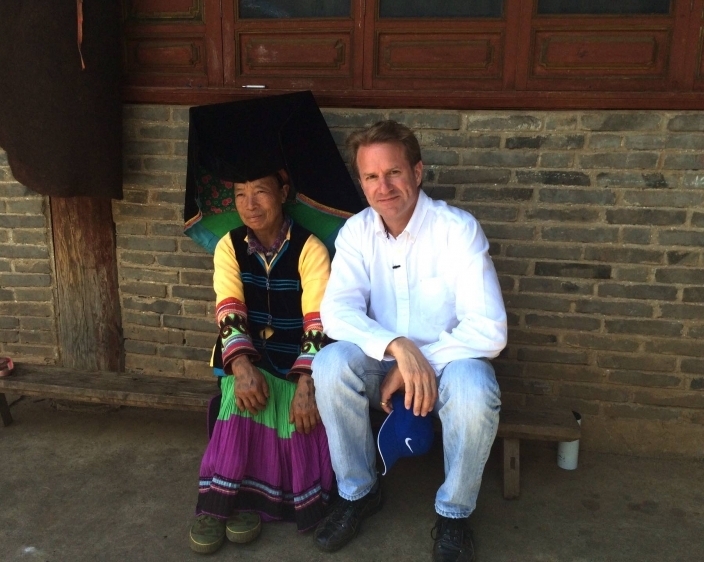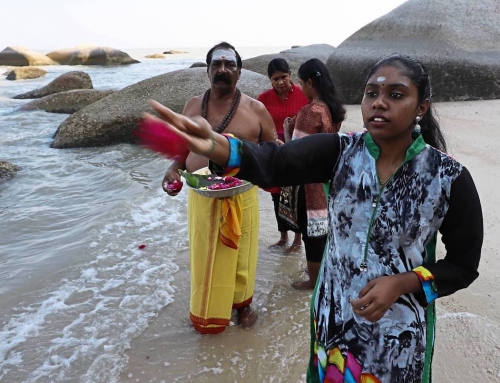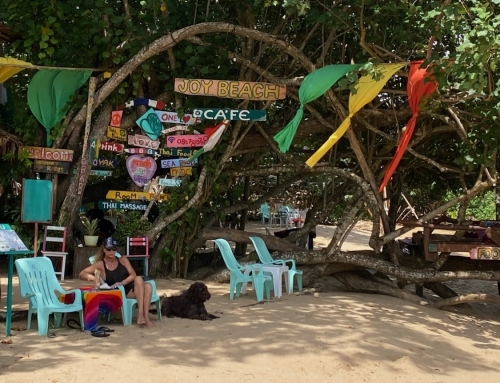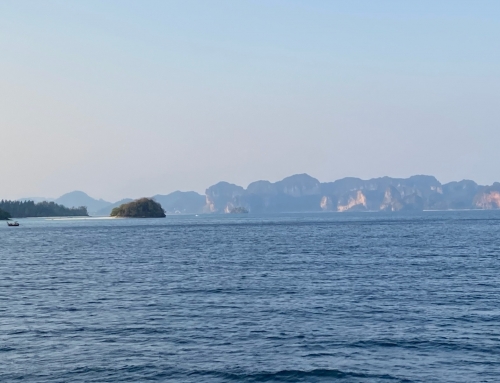In part one of this story I recounted how I had already visited the Kang family in Tsu Nan Guo, which is

Maca, originally from South America is grown widely throughout the Yunnan highlands
a small village tucked away behind Jade Dragon Snow Mountain, about an hour’s drive out from Lijiang city. It was a rare and humbling experience. The most confronting thing for me was what appeared to be the simplicity of their life. They farmed maca, a cash crop, which they sold to an agent in Lijiang, and otherwise lived off the land. Growing maca is tough work as it is harvested late in the year and often through over 30 cm of snow, which starts to fall in October.

Antique Musket circa 1890 and small bore rifle
During my first visit, our host Mrs Lu had prepared a welcome meal by stewing some meat which had been dried and was hanging from a beam in the ceiling. Her father in law Mr Kang went to collect wild vegetables from the mountain side and pulled fresh potatoes from their garden. When it was time to eat, we sat on bed mats in front of a small low wooden table, near a fire in the centre of the room.
I noticed there was an antique musket (which Mr Kang still used from time to time, apparently) hanging on the wall above a small bore rifle. Though I didn’t ask at the time, this suggested either a connection to the ‘Ancient Tea Horse Trade’ mule caravans which frequently needed protection, or perhaps the marauding Yi bandits who waited in ambush to rob them at any time. The Yi people had a fierce reputation even in more recent times, but back then were capable of committing terrible acts of murder and slavery.

The long and dusty road to school
Nowadays the often remote location of the Yi villages means that the children who live there have to walk a long way to get to school. For the children of Tsu Nan Guo that means a two hour walk to Wen Hai valley primary school. They set off on foot each Monday morning, stay at the school all week in dormitory accommodation, before returning to their village each Friday afternoon. It is the same all year round, even in the winter snow.

Michelle’s visit and the black chicken
A couple of years ago wife Michelle came to visit me from Australia. It was her first time to China and I felt an experience with the Yi would be quite special for her. By then I had come to know the Kang family a little better, so with my Banyan Tree community CSR manager Ke Yan, we arranged for another visit, this time taking with us gifts of a large dried Yunnan ham for Mrs Lu and two bottles of rice wine for Mr Kang.
On this occasion and much to the distress of Michelle, they cooked a whole black chicken, taken from their small brood in the yard. Yes, whole. Guts, gizzards, unlaid eggs and all…
During the course of conversation that day, Mrs Lu remarked that we came from a very different world and were so well off compared to her family. She seemed puzzled when I mentioned that what we were seeing was indeed a very special experience for most western people. The whole time spent with the Kang family that day made quite an impression on Michelle…
During that visit I suggested to Mrs Lu that we could to do more to support her village, since the price of maca had crashed through over production in the south of Yunnan. Again I tried convince her that we could set up a tourism business connection with the village and even suggested that we could bring people up to help with the maca harvest. She was polite but said it would be quite difficult for visitors.
I also offered some money to bring the occasional small, but well travelled (and briefed) tour group to visit the village, however she didn’t really seem to take to that idea. I told her western people would pay a lot of money to experience their life and what they have. But I didn’t press it. And so we departed, but not before expressing our deepest thanks to all the family.

Yi children in Wen Hai valley
Some time later I was approached by a Canadian documentary film maker who was looking for stories relating to the Yunnan minorites. The planned documentary would be part of a series to be shown on China Global Television Network. So after some discussion and clarification, and as part of the Banyan Tree CSR outreach programme we contacted Mrs Lu about her family being a part of this documentary. To my surprise, she agreed.

Meet the Kang family
Once they arrived, the film crew spent a lot of time in the area. They visited the Wen Hai valley and met with some of the school children who dressed in traditional Yi costume. But when the time came to visit the Kang’s the film shoot was a long and somewhat invasive process. I do feel we might have over stayed our welcome. I got a sense that it became too much of an imposition, especially for the parents. They are very humble people and our presence and all the attention was probably too much for them.
Following that visit, I decided it would be better to leave them alone for a while.
For now we are helping indirectly as one of the children from the village has been selected to be a part of Banyan Tree’s “Seedlings” education sponsorship programme. He aspires to becoming a pilot. We recenly arranged for him to spend two days in Beijing at flight centre control, flying business class with Juneyao Airlines. But that is another story…
Soon to follow; Lugu Lake, the Mosu people and the famous free and open marriage system of their matriarchal society.





